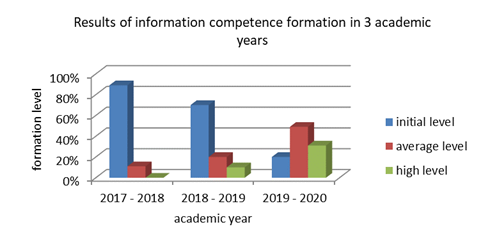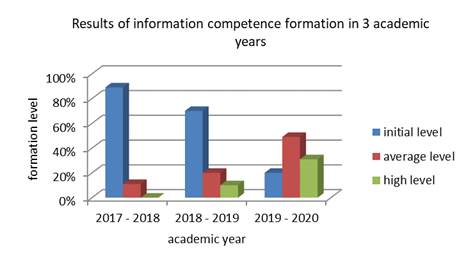Abstract
The formation of information competence is an urgent task in the modern education system. The professionalism of the future teacher includes various competencies, including information. Moreover, information competence is becoming one of the priorities of modern higher education. The practical result of the research carried out at a pedagogical university is a model of the formation of information competence of students in pedagogical areas of training. The model is a system of general requirements for the formation of information competence in a pedagogical higher educational institution. The article lists methodological recommendations that illustrate the constituent elements of the model. They are the result of lessons learned from practical activity and can be useful for teachers of natural science and engineering disciplines who solve the problems of forming information competence in the course of their educational activities. The analysis of the results of the implementation of the developed model shows its effectiveness. The comparison of indicators of the formation of information competence over the last three academic years allows us to conclude that the organization of educational activities in accordance with the model gives stable high results.
Keywords: Information competence, pedagogical universities, education
Introduction
The processes of modernization of higher education have become an unconditional reality in the 21st century on a global scale. In the conditions of the formation of the information society and the informatization of all spheres of human activity, the need for specialists who are ready and able to use modern information and communication technologies in professional activities has sharply increased (Bershadskaya et al., 2019).
Problem Statement
The task is to form among students in pedagogical areas of training not only a system of professional knowledge and skills within clearly defined boundaries of requirements for a future specialist, but also information competence, which allows them to most effectively solve urgent practical problems in the wide context of professional situations using information and communication technologies.
Research Questions
With the development of the information society, an important component has been added for the teacher - information competence (Vyalikova et al., 2020). Information competence is a part of the general process of informatization, which is an "objective process", and its development is inextricably linked with the process of informatization of education. For the qualitative formation of information competence among students of pedagogical directions, it is necessary to determine its essence, highlight the content and components (Rasskazov & Mityushenko, 2017).
Purpose of the Study
Based on the research performed, it is necessary to highlight the components that should be correlated with the normative knowledge about the process of modeling expected results (Yaroslavtseva et al., 2019). The structure of the model for the formation of students' information competence includes the following components: content-targeted, organizational-activity, effective-evaluative. All components of the structural and functional model are closely interconnected. The model includes the needs of the modern information society, the goal, principles and tasks of the formation of information competence, requirements for the professional competence of the teaching staff, forms and technologies of teaching, means and logistical support, information environment, results and methods of monitoring.
Research Methods
The research methodology is based on the following methods: observation, description, modeling, experiment, formalization, etc.
Findings
The formation of information competence is an important task of the educational process at the I.Ya. Yakovleva Chuvash State Pedagogical University. Therefore, the development of the formation model is necessary and relevant.
For three academic years (2017-2020), work was carried out to study the level of formation of information competence of students in pedagogical areas of training. The elements included in the information competency formation model have been tested since 2018. Systematic work on the implementation of the proposed model was carried out during the 2018-2020 academic year.
The theoretical component of the information competence was tested in the form of testing future teachers.
In the 2016-2017 academic year, a database of computer tests was created (mainly in the Moodle system) on the main topics of the course and for organizing the final testing. Three years of work using the created database made it possible to conclude that computer testing by the 2019 - 2020 academic year became a common way to assess the level of knowledge in computer science and ICT.
The development of information competence involves monitoring this process using special diagnostic tools (Osipov et al., 2017). Students began to work with the computer testing system more freely, the speed of familiarization with the task and the definition of the algorithm of actions increased. If after the first cases of using computer testing, about 50% of students returned to the test because of an unsatisfactory result, then the maximum share of unsatisfactory marks by April 2020 was 2.5%.
The formed information competence allows to independently search for information to improve the level of knowledge, conduct analysis, select, transform, save and distribute it in the information field (Kondrasheva, 2018).
The level of formation of informational skills and abilities was checked through the implementation of practical work. In the 2016-2018 academic year, a set of tasks was developed for performing practical tasks on the main topics of the computer science and ICT course. During three years, practical work was carried out in accordance with these tasks. The results were analyzed.
Figure 1 shows the results obtained from the analysis of the formation of information competence over the last three years of study.

Based on the results presented in Figure 1, we can conclude:
- the proportion of students fully completing the assigned task has increased;
- the level of independence in performing work has increased;
- the range of information processing methods involved in the work has expanded;
- the desire to document the results of work has increased, even if this was not determined by the requirements of the assignment;
- during the presentation of the work results, the orientation has changed from "as many effects as possible" to "the applied effects must correspond to the content of the work."
The level of development of personality traits was also assessed in the process of analyzing the portfolio, as well as conducting a questionnaire.
A student's portfolio is a tool for monitoring his achievements in all subject areas. Informatics is no exception and the portfolio of students in recent years has been enriched by achievements in informatics and information technology. Together with future teachers, we regularly take part in various events that require knowledge of information technology: the International Student Distance Olympiad of the Moscow State Pedagogical University "Pedagogical Digital Science", the International Game Competition "InfoZnayka", the All-Russian Creative Competition for Children and Youth "Cyberpatronus", the All-Russian Olympiad in Office Technologies and etc. In many competitions and olympiads, students of pedagogical areas of training not only showed good knowledge and skills in the field of information processing, but also reached the level of winners, which was not the case at the time the model of information competence formation began.
When developing monitoring the effectiveness of the implementation of a model for the formation of information competence, we also used a three-component model of information competence, reflected in the work of H. Lau, written on the basis of foreign standards for information competence, in which the author identifies three main components (Lau, 2007).

Instruction. Rate your actions in terms of working with information: 0 - never, 1 - rarely, 2 - in most cases, 3 - always.
Interpretation of results. The maximum number of points for this questionnaire is 68.
If the sum of points is 55 and more, this means possession of information competence at a high level, 45 - 54 points indicate an average level of information competence formation, 45 and less indicate a low level of information competence formation (Figure 2).
Conclusion
The research shows that at this stage the conditions for the formation of information competence of students of pedagogical directions at I. Ya. Yakovlev Chuvash State Pedagogical University have been implemented, but it seems necessary to carry out systematic work to maintain them at a level sufficient to form the information competence of future teachers.
In order to improve their professional skills, the teachers of the university undergo advanced training programs both on its own basis, and on the basis of other universities.
It should be noted that the activities to improve the qualifications of teaching staff should be systematic. In order to more effectively use of modern information technologies by teachers, a program of a practice-oriented course is being developed, which will be taught by teachers of informatics and ICT on the basis of computer classes.
Federal state educational standards of higher education make serious requirements for future graduates of pedagogical training areas in terms of mastering and applying modern information technologies in professional activities (Gerasimova et al., 2020).
Thus, the introduction of the model for the formation of information competence in the educational activities in I. Ya. Yakovleva Chuvash State Pedagogical University shows its effectiveness. It is also necessary to identify areas that require further elaboration: the development of the information environment of the university and the professional competence of the teaching staff.
References
Bershadskaya, M. D., Serova, A. V., Chepurenko, A. Yu. & Zima, E. A. (2019). Competence approach to evaluation of educational results: experience of Russian sociological education. Higher education in Russia, 2, 38-50.
Gerasimova, A. G., Kopysheva, T. N., Mitrofanova, T. V., Smirnova, T. N., & Fadeeva, K. N. (2020). Perfection and Development of Infocommunication Competencies of Students Studying in the Conditions of Creative Laboratory of Computer Graphics and Digital Photography. Proceedings of the International Scientific Conference “Digitalization of Education: History, Trends and Prospects”.
Kondrasheva, N. N. (2018). Formation of information competencies of a higher school teacher. Perspectives of science and education, 6(30), 26-8.
Lau, H. (2007). Information literacy guide for lifelong learning. MOO WFP UNESCO "Information for all".
Osipov, V. V., Bugaeva, T. P., & Bratukhina, N. A. (2017). Development of bachelor's information competence in the conditions of master's training. Modern science-intensive technologies, 4, 118-22.
Rasskazov, F. D., & Mityushenko, E. V. (2017). The essence of the content and components of information competence of students of pedagogical direction. Modern problems of science and education (Electronic Materials), 5.
Vyalikova, G. S., Erofeeva, M. A., Plekhanova, M. V., Pluzhnikova, Yu. A., & Savelyeva, S. S. (2020). Modeling the process of forming students’ general pedagogical ICT competence on the basis of system-and-activity approach. Perspektivy nauki i obrazovania [Perspectives of Science and Education], 43(1), 39-56.
Yaroslavtseva, N. V., Lopukha, T. L., Dakhin, A. N., & Suslov, D. V. (2019). Structural components of the process of modeling open education outcomes. Perspectives of Science and Education, 39(3), 55-72.
Copyright information

This work is licensed under a Creative Commons Attribution-NonCommercial-NoDerivatives 4.0 International License.
About this article
Publication Date
25 September 2021
Article Doi
eBook ISBN
978-1-80296-115-7
Publisher
European Publisher
Volume
116
Print ISBN (optional)
-
Edition Number
1st Edition
Pages
1-2895
Subjects
Economics, social trends, sustainability, modern society, behavioural sciences, education
Cite this article as:
Fadeeva, K. N., & Gerasimova, A. G. (2021). Results Of Information Competence Formation Of Students Of Pedagogical Directions. In I. V. Kovalev, A. A. Voroshilova, & A. S. Budagov (Eds.), Economic and Social Trends for Sustainability of Modern Society (ICEST-II 2021), vol 116. European Proceedings of Social and Behavioural Sciences (pp. 1078-1083). European Publisher. https://doi.org/10.15405/epsbs.2021.09.02.119

